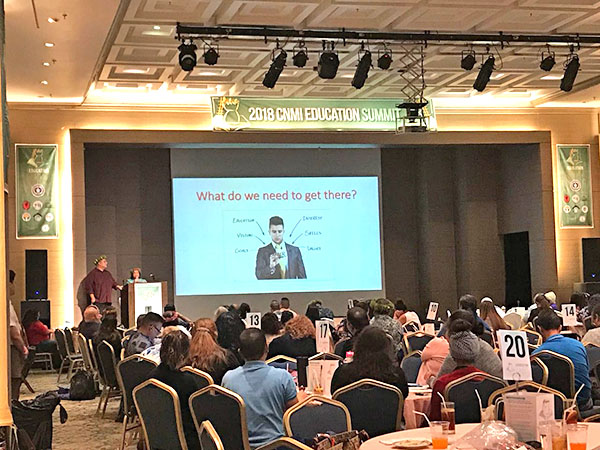Education summit focuses on workforce development

Guest speakers Josephin Mesta and David Attao on the stage during the first day of the first educational summit in the CNMI yesterday at the Saipan World Resort. (Contributed Photo)
The first day of a three-day education summit—the first of its kind organized in the CNMI—focused primarily on workforce development in the CNMI.
The Royal Taga Hall of the Saipan World Resort was packed yesterday with 240 summit participants.
The summit itself was organized by the Public School System, the Northern Marianas College, and the Northern Marianas Trades Institute.
The Department of Labor, the 20th CNMI Legislature, the Department of Fire and Emergency Medical Services, the Department of Commerce, the Saipan Chamber of Commerce, the Latte Training Academy, and other critical government and non-government agencies also attended.
“We are doing an assessment of what we have as a community in terms of our education system in PSS, NMC, or NMTI. We are also identifying areas we need to focus on,” PSS interim commissioner Glenn Muña told Saipan Tribune.
The main focus, according to the summit agenda, was about identifying occupational and career trends as well as training to prepare students to transition into the workforce.
“…Our business partners are looking at what we can do as an educational system to assist them in providing…a workforce they can hire,” Muña said.
The 240 registrants were divided into several smaller groups to discuss various factors possibly inhibiting the enhancement of the current workforce in the CNMI.
The guest speaker for the day, DOL Workforce Investment Act director David Attao, told Saipan Tribune that several training programs NMC, NMTI, and even the Latte Training Academy are “hitting niches” of what is in-demand.
“We need to invest in our education instructors, our facilities, our equipment, and tools, etc. to help our trainings take place,” said Attao, replying to the question of whether there is a shortfall in the programs offered on-island. Attao believes rather that there is a lack of “spending money in the right places and allowing the money to [yield] a good return of investment.”



























